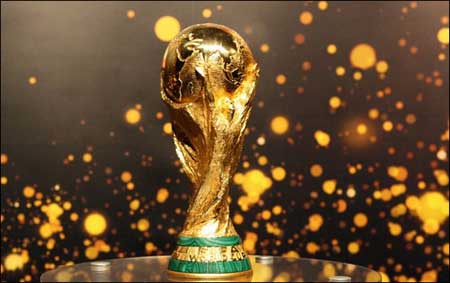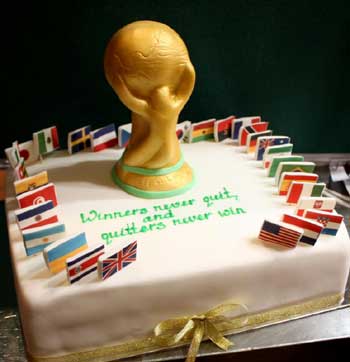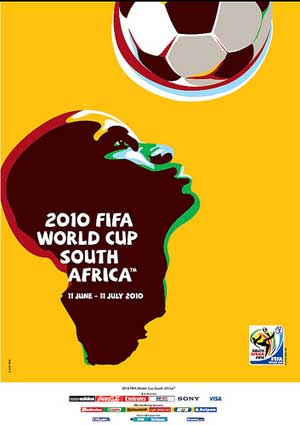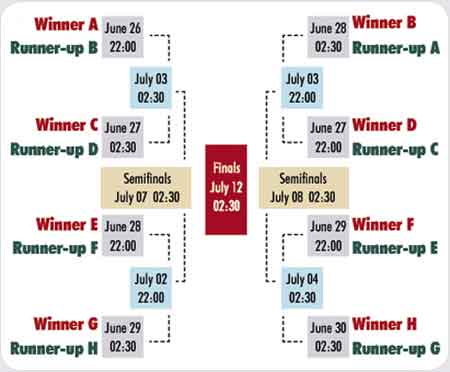導(dǎo)讀:2010年南非世界杯開(kāi)賽在即,作為四年一屆的體壇盛會(huì),億萬(wàn)球迷無(wú)不心神往之。老牌勁旅,新晉黑馬(dark horse)悉數(shù)登場(chǎng),群雄逐鹿綠茵場(chǎng)上,是實(shí)力說(shuō)話(huà),還是命數(shù)已定?但是比賽的魅力恰恰在于,不到最后一刻你永遠(yuǎn)不知道誰(shuí)是贏家。

It is only natural that the world's biggest sport has the world's biggest rivalries. From European, warring neighbors to mortal enemies, the best sides in the world all have that team that they want to beat more than any other.
世界最大的體育賽事自然要配上世界頂級(jí)的較量。不管是歐洲,抑或正在交火的鄰國(guó),或者是不共戴天的勁敵,世界上實(shí)力最強(qiáng)的國(guó)家都擁有一支雄心勃勃誓要戰(zhàn)無(wú)不勝的球隊(duì)。
What follows is by no means the definitive list. Imagine if the Democratic People's Republic of Korea faced off against the US – or if Australia came up against its arch-enemy, New Zealand.
以下猜想絕非定論。試想一下,如果朝鮮與美國(guó)同場(chǎng)競(jìng)技,或者澳大利亞隊(duì)與勁敵新西蘭隊(duì)狹路相逢,將是怎樣一番情景?
The following will take you through the World Cup favorites and dishes up the dirt.
接下來(lái),我們將一同領(lǐng)略世界杯熱門(mén)球隊(duì)的風(fēng)采,對(duì)它們?cè)u(píng)頭論足一番。

冰火之爭(zhēng) Apples and oranges rivalry
This is a philosophical rivalry. Germany and Brazil are two nations that dominate the World Cup, but their footballing styles are like apples and oranges.
這次對(duì)陣充滿(mǎn)哲學(xué)意味。德國(guó)和巴西在世界杯上的地位舉足輕重,但他們的比賽風(fēng)格卻是截然不同。
Brazilian football is an attacking, free-flowing style of play. In Brazil they make sure they play ‘Joga Bonito’ (the beautiful game). German football is about efficiency and tactical mastery. In Germany, they call their team tournament team because they are so good at finding ways to win in tournaments.
巴西足球擅長(zhǎng)進(jìn)攻,行云流水自成一格。在巴西,人們確信他們是在享受“美麗足球”。德國(guó)足球注重效率與戰(zhàn)術(shù)專(zhuān)攻。在德國(guó),他們稱(chēng)自己的球隊(duì)是大賽型球隊(duì),因?yàn)樗麄兩朴谠诖筚愔性O(shè)法奪冠。
Amazingly, the two heavyweights have only ever played each other once in the World Cup. The 2002 World Cup Final saw Ronaldo embarrass Germany. They are on track to meet each other again in this year’s final.
令人頗感意外的是,這兩支重量級(jí)球隊(duì)在世界杯上只有一次交手。在2002年世界杯決賽上羅納爾多使整個(gè)德國(guó)隊(duì)?wèi)K敗而歸。在今年的決賽中兩隊(duì)有望再次交戰(zhàn)。

藍(lán)魔之戰(zhàn) Battle of the blues rivalry
Zinedine Zidane's baldhead striking Italian defender Marco Materazzi in the chest in the 2006 World Cup Final is one of the most iconic images in football history. It also cemented the bitter rivalry between the two blue-shirted European countries.
2006年世界杯決賽上,齊內(nèi)丁?齊達(dá)內(nèi)用光頭撞向意大利隊(duì)后衛(wèi)馬爾科?馬特拉齊的前胸,這一幕也成為足球史上最具標(biāo)志性畫(huà)面之一。這也奠定了兩支同樣身穿藍(lán)色球衣的歐洲隊(duì)成為賽場(chǎng)上的死敵。
For the last 30 years, France has had the upper hand in major tournaments. They knocked Italy out of the World Cup in 1998 on penalties. And they snatched victory from the jaws of defeat in the European Championship Final in 2000.
在過(guò)去的30年中,法國(guó)隊(duì)一直在重要賽事中占據(jù)上風(fēng)。在1998年的世界杯上,法國(guó)隊(duì)以點(diǎn)球擊敗意大利隊(duì)。在2000年的歐洲杯決賽中他們險(xiǎn)勝意大利。
利比里亞半島之戰(zhàn) Iberian neighbors rivalry
Portugal and Spain share the land on the westernmost point of Europe, called the Iberian peninsula. Living so close, they have had a checkered political and cultural history. In one case, in the Middle Ages, King Philip II of Spain decided to declare himself Philip I of Portugal.
葡萄牙與西班牙雙雙地處歐洲最西部,那里被稱(chēng)為利比里亞半島。由于相互毗鄰的關(guān)系,兩國(guó)的政治文化史有著許多交匯之處。一個(gè)例子就是,中世紀(jì)時(shí)期,西班牙國(guó)王菲利普二世自稱(chēng)葡萄牙菲利普一世。
On the football pitch, they couldn't be more alike. Both teams play a similar passing game with flashes of brilliance. And both are considered perennial underachievers. Most of the Portuguese players also play in the Spanish league.
在綠茵場(chǎng)上,他們簡(jiǎn)直太像了。兩隊(duì)不時(shí)閃現(xiàn)出相似的傳球手法,都被認(rèn)為長(zhǎng)期成績(jī)平平。許多葡萄牙球員同時(shí)也在西班牙足球俱樂(lè)部中效力。
If the two meet in the second round, the clash will mean more than life itself to the fans. Consider ex-Portuguese coach Luiz Felipe Scolari's comment before a game against Spain in 2004: "This is war, and I have to kill and not be killed."
如果兩隊(duì)在第二輪相見(jiàn),那么球迷一定會(huì)將這場(chǎng)比賽看得比自己生命還重要。回想2004年時(shí),葡萄牙隊(duì)前主教練路易斯?菲利佩?斯科拉里在與西班牙隊(duì)對(duì)陣之前曾表示:“這是一場(chǎng)戰(zhàn)役,只許勝不許敗。”

為“上帝之手”而戰(zhàn) ‘Hand of God' rivalry
No two teams have more World Cup history than Argentina and England. It's fair to say they hate each other.
沒(méi)有哪支球隊(duì)能像阿根廷隊(duì)和英格蘭隊(duì)與世界杯有如此深的淵源。說(shuō)他們彼此仇視一點(diǎn)都不假。
After the two nations fought each other in the 1982 Falklands War, they came face-to-face in a 1986 World Cup quarter final. Diego Maradona enraged most of England when he scored a crucial goal with his hand. It has gone down in history books as the "Hand of God" goal.
1982年馬島戰(zhàn)爭(zhēng)之后,兩國(guó)在1986年世界杯1/4決賽時(shí)狹路相逢。迭戈?馬拉多納用手攻入了關(guān)鍵一球,此舉著實(shí)激怒了英國(guó)人。這一記“上帝之手”進(jìn)球已被載入史冊(cè)。
The rivalry deepened at the 1998 World Cup when David Beckham was controversially sent off for kicking an opponent.
在1998年世界杯上頗具爭(zhēng)議的一幕發(fā)生了,大衛(wèi)?貝克漢姆由于一個(gè)腳踢對(duì)方球員的爭(zhēng)議性動(dòng)作而被罰下場(chǎng),這使得兩隊(duì)的競(jìng)爭(zhēng)進(jìn)入白熱化。
They will meet in the quarter-finals, and – if recent history is a guide – it will be a controversial game.
這次兩隊(duì)將對(duì)陣1/4決賽,就以往的經(jīng)驗(yàn)來(lái)看,這次比賽又將引發(fā)眾多爭(zhēng)議。
相關(guān)閱讀
歷屆世界杯吉祥物集錦
巴西妓女借熱世界杯 推出色情T(mén)恤
日本申辦2022年世界杯 許諾提供3D直播
調(diào)查:德國(guó)人愿為看世界杯國(guó)足決賽舍棄做愛(ài)
(來(lái)源:21世紀(jì)英文報(bào) 編輯:Julie)